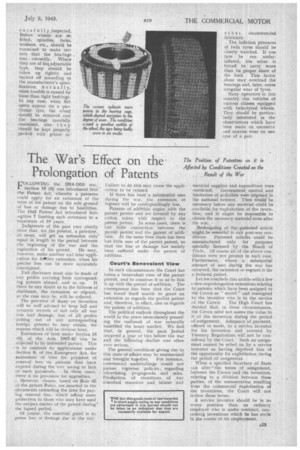The War's Effect on the Prolongation of Patents
Page 25

If you've noticed an error in this article please click here to report it so we can fix it.
The Position of Patentees as it is Affected by Conditions Created as the . Result of the War FOLLOWING the 1914-1918 war, Section 18 (6) was introduced into the Patent Act, whereby a patentee could apply for an extension of the term of his patent on the sole ground of loss or damage due to hostilities. The 1942 Patent Act introduced Subseetion 7 limiting such extension to a maximum of 10 years.
Judgments of the past year clearly show that, for ,the present, a patentee, at most, will get an extension only' equal in length to the period between the beginning of the war and the
expiration of his patent. He may, however, make another and later application for blither extension, when his precise loss can he more accurately ascertained.
Full disclosure must also be made of any prOfits accruing from correspond ing patents abroad, and so on. If there be any doubt as to the fullness of disclosure, the extension or regrant, as the case may be, will be reduced..
The patentee of Many an invention will be well advised to keep full and accurate records of not only all war itl!i'S and damage, but of all profits • arising out of any corresponding foreign patentshe may obtain, for reasons which will be obvious later, . Extensions of term. under Section 18 r6) of the Acts 1907-42 can be objected to by interested parties.. This
• is in contrast to applications under Section 6, of the Emergency -Act, for extensions • of time for payment of renewal fees on patents that have expired during the war owing to lack of such payments. In these cases, there is no provision for oppositiou. However, clauses, based on Rule 6:5 of the patent Rules, are.inserted in the -documents extending the time for paying renewal fees, which afford some protection to those who may have used the subject matter of the patent during' the lapsed period. •
Of course. the essential point is to prove loss or damage due to the war.
Failure to do this may cause the application to be refused: If there has been a substantial user during the war, the extension or regrant will be correspondingly less.
Patents of additichi expire with the parent patent and are covered by any action taken with respect to the parent patent. In some cases, there is hut little connection between the parent patent and the patent of addition. At the same time there has been but little user of the parent patent, so that the loss or damage has mainly been suffered under the patent of addition.
Court's Benevolent View In such circumstances the Court has taken a benevolent view of the parent patent, and to construe it so ai to link it up with the patent of addition. The consequence has been that the Court has found itself unable to grant an extension as regards the paeent patent and, therefore, in effect, also as regards the patent of addition.
The political outlook throughout the world in the years immediately preceding the outbreak of war naturally iniettled the home market. We find that,. in general, the peak period occurred a year or two before the war and the following .decline was often very serious.
The genera: conditions giving rise to this state of affairs may be summarized and brought together. For instance, commercial undertakings would not pursue vigorous policies, regarding advertising, propaganda and sales. Production of munitions of ,war absorbed resources and labour and material supplies and expenditure were restricted. Government control and limitation of activities were imposed in the national interest, Time would be necessary before any material &Mid be available,for exploitation of the invention, and it might be impossible to obtain the necessary material even after the war.
Redesigning of the --patented article might be essential to suit post-war conditions. Patented articles could be manufactured only for purposes specially licensed . by the Board of Trade. Of course all of the above conditions were not present in each case. Furthermore, where a substantial amount of user during the war has occurred, the extension or regrant is for a reduced period.
Let me conclude this article with a few motes on prolongation extensions relating to patents which have been assigned to the Crown as " secret" and reassigned to the inventor who is in the service of the Crown. The high Court has decided that, in these circumstances, the Crown need not assess the value to it of the invention during the period of assignment. Adequacy of payment, offered or made, to a service inventor for his invention aud covered by Treasury Regulations will not be considered by the Court. Such an assignment cannot be relied on by a service inventor as having deprived him of 1:he opportunity for exploitation. during the period of assignment, . When a specified Secretary of State can alter • the. terms of assignment, between the Crown and the inventors, relating to a division between these parties, of the remuneration resulting from the commercial exploitation of the inventions, the Court will not review those terms.
A service inventor should be in no worse position than an ordinary • employee who is under contract, concerning inventions which he has made in the course of his employment.




















































